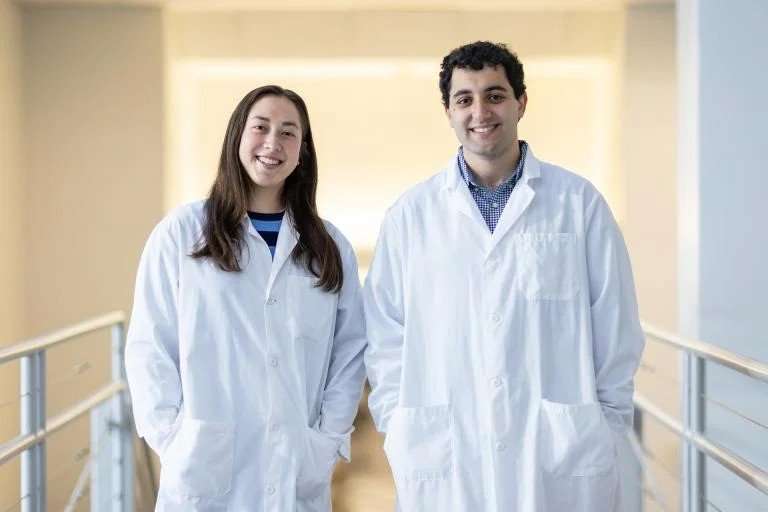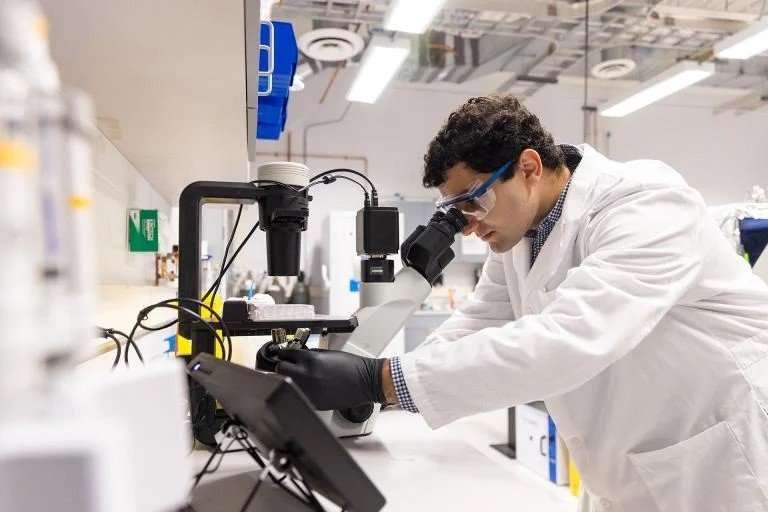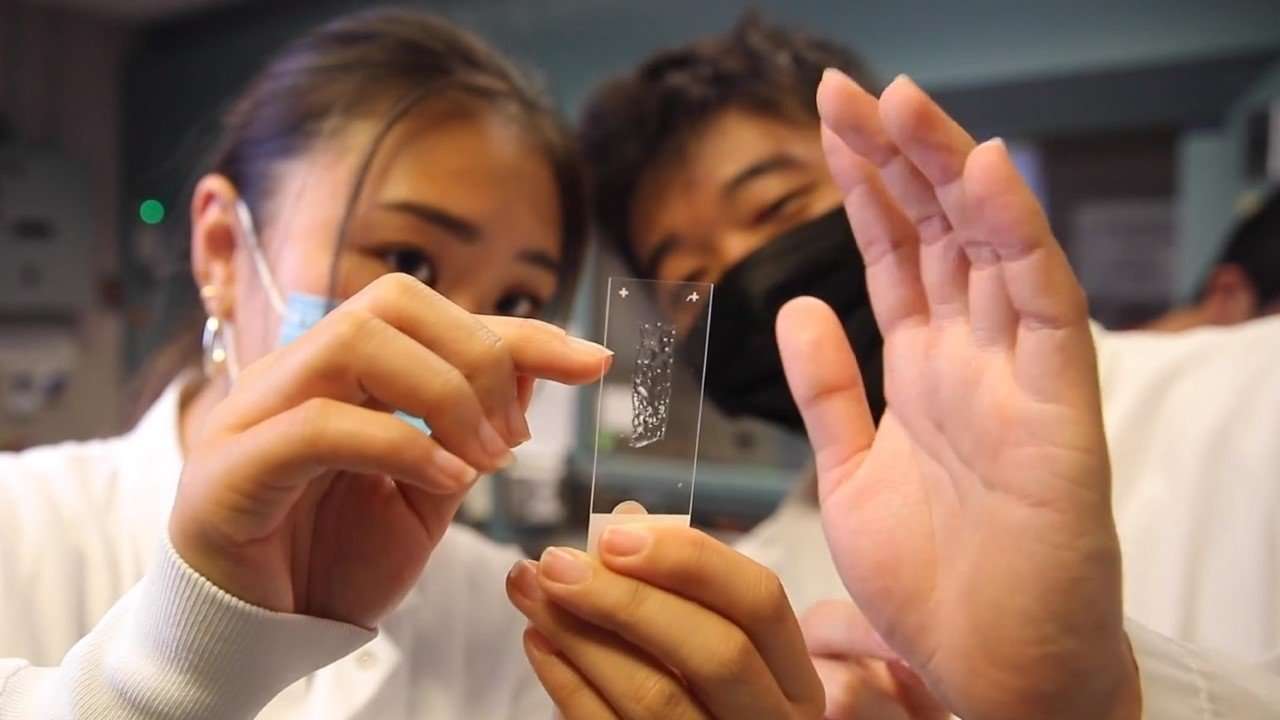Source: Tufts University
Jump To ‘What Is Cellular Agriculture?‘
This fall, Tufts launched the world’s first undergraduate degree in cellular agriculture — a minor that allows students to take a deep dive into the groundbreaking field.
In his Value Creation project in Cell Ag class, Tufts senior Adham Ali faced an intriguing assignment: work with a group of peers to design a product that uses cellular agriculture (or cell ag, for short) to make life easier for consumers.
Majoring in biochemistry, Ali took the class as part of his minor in cell ag—a minor he registered for only this semester, because it’s brand-new at Tufts.
It’s also the world’s first and only undergraduate degree in the field.
Usually used as part of a nascent—and rapidly growing—field that cultivates lab-grown meat from cells in bioreactors, the processes of cellular agriculture can be applied to non-meat products. In the class, students used design principles to create cell-ag solutions to problems. “It was incredibly eye-opening, and it changed the way I think about research,” says Ali.
The product he and his group designed? An endless essential oil diffuser. “You would put your diffuser in the house and the cells would keep growing to create essential oils that make your house smell better,” he says. “You’d never have to go to the store for essential oils again.
A First Ever Opportunity

Seniors Olivia Calkins and Adham Ali have conducted research in the Kaplan Lab, held summer internships that exposed them to aspects of the industry, and co-founded the Tufts chapter of the Alt Protein Project to increase engagement in the field of alternative protein sources. Now they are both enrolled in the first-ever minor in cellular agriculture. Credit: Jenna Schad
Like Ali, senior Olivia Calkins registered for the minor at the start of this semester. A chemical engineering major, Calkins always knew she wanted a career dedicated to helping animals and the environment.
“I first discovered cell ag on my first day of freshman year, and I knew right away it’s what I want to do with the rest of my life,” says Calkins. “This is my dream. I started becoming involved in the Kaplan Lab, doing everything I could to immerse myself in the field. But it wasn’t until now that I could actually get a degree in it. I’m so excited about that—it’s a huge stepping stone for cell ag.”
David Kaplan, Stern Family Professor in the Department of Biomedical Engineering and executive director of the Tufts University Center for Cellular Agriculture (TUCCA), agrees. The new minor is a vital step toward securing the future of cellular agriculture, according to Kaplan.
“Graduate students have had the opportunity to contribute to research and industry aims in cellular agriculture for a while now,” says Kaplan. “But while we’ve offered classes to undergraduates and welcomed them into the lab, ours is now the first program that allows them to graduate with an actual degree in the field.”
“Now we’ll have the chance to guide and collaborate with students who have an interest in cell ag from their earliest days at Tufts,” he says. “Eventually, they’ll enter the field as professionals with a deep background and years of engagement in the subject.”
Preparing Students To Be Pioneers

Adham Ali examining specimens under a microscope in the Kaplan Lab. Credit: Jenna Schad
The minor in cellular agriculture has been designed to provide undergraduates with the opportunity to advance tissue engineering research and to translate cellular agriculture research into food industry innovation. A convergence of many disciplines, the minor is available to students in either Tufts School of Engineering or the School of Arts and Sciences.
Students who register for the minor take six classes in the subject, including two core courses, a research project course, and three elective courses. Electives include offerings such as Food, Nutrition, and Culture; Food Systems: From Farm to Table; and Bringing Products to Market.
As seniors, both Ali and Calkins fulfilled the requirements for the minor before the minor even existed. That was, according to Calkins, a happy coincidence— “purely the result of curiosity and love for the subject,” as she puts it. Both students also took advantage of opportunities to conduct their own research in the Kaplan Lab and as well as summer internships that exposed them to aspects of the industry.
In addition, they co-founded the Tufts chapter of the Alt Protein Project, a global initiative by the Good Food Institute to increase university engagement in the field of alternative protein sources. Now, while also working on senior thesis projects, they are in the process of planning a Spring 2024 research conference open to students at all universities in the area, with the aim of increasing awareness of opportunities in the field.
And what’s next? After graduation, Calkins will go to work for a Boston-based company that makes bioreactors for cultivated meat. Ali aims to pursue an MD/Ph.D. degree, with the goal of becoming an expert in the area where knowledge about cellular agriculture overlaps with medical practice. “No matter what,” Ali says, “I want to figure out how whatever I end up doing can be applied to cellular agriculture.”
What is Cellular Agriculture?
Produced by Anna Miller, Ronee Saroff and Jenna Schad – Filmed by Anna Miller
The world population is expected to reach 9.7 billion by 2050. With it will come a doubling in the amount of animal protein we consume. Cellular agriculture may be a part of the answer.


